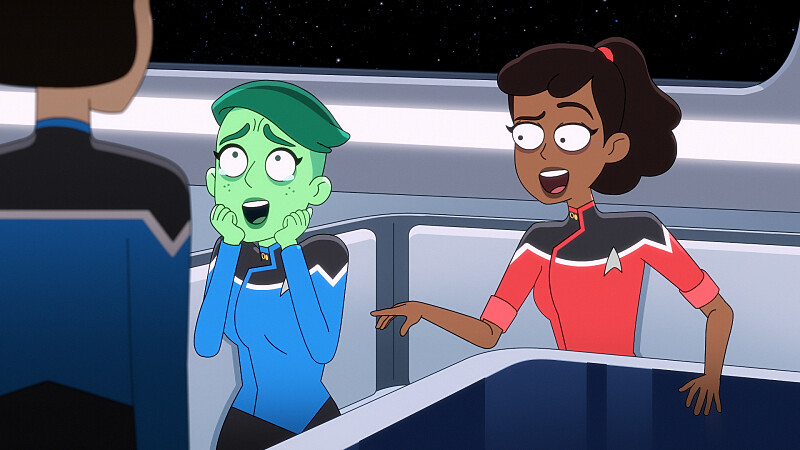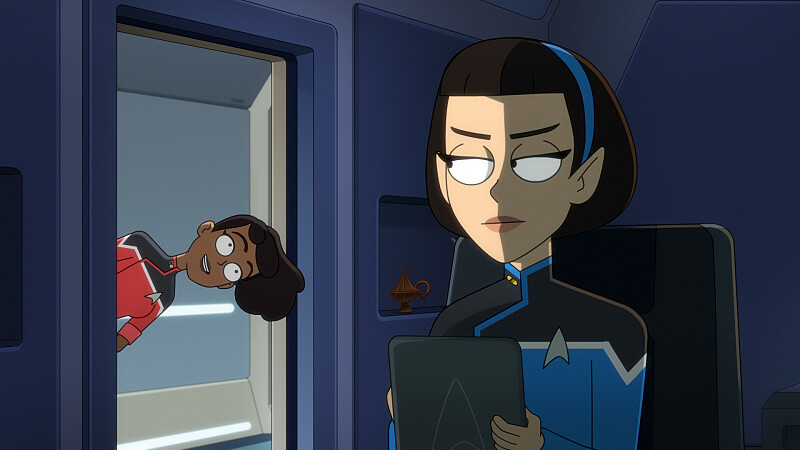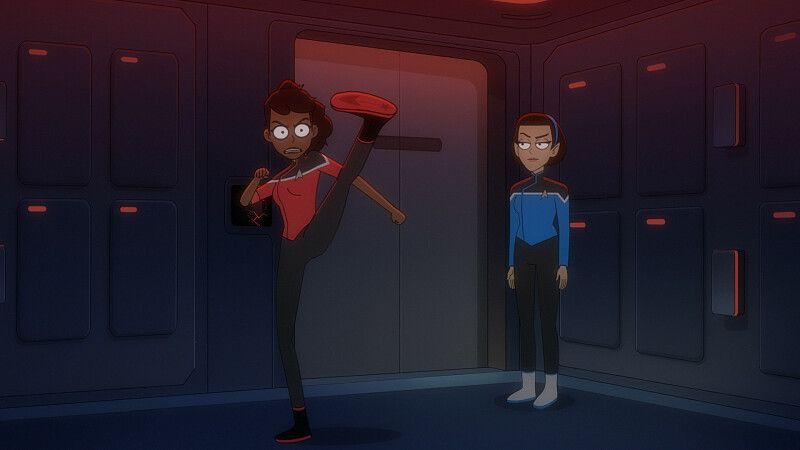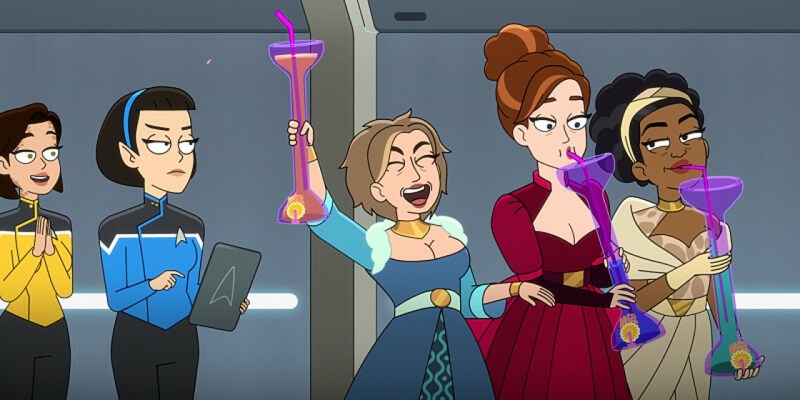This recap and review contains spoilers for Star Trek: Lower Decks season 4, episode 5, “Empathological Fallacies,” streaming now on Paramount+.
The fourth season of Star Trek: Lower Decks got off to a relatively strong start. The four-episode run from “Twovix” to “Something Borrowed, Something Green” provided a showcase of Lower Decks’ various strengths. “Twovix” was the fan-service-heavy episode, “I Have No Bones Yet I Must Flee” was a standard sitcom setup, “In the Cradle of Vexilon” was a fairly decent Star Trek episode with jokes, and “Something Borrowed, Something Green” was a showcase of Lower Decks’ internal continuity.
As such, it’s a disappointment that the season stumbles with its fifth episode, “Empathological Fallacies.” It’s particularly frustrating because this is clearly the episode designed to showcase the new addition to the cast, the Vulcan Lieutenant T’Lyn (Gabrielle Ruiz). Unfortunately, “Empathological Fallacies” doesn’t really work as an episode in its own right and it doesn’t make a particularly compelling case for the show’s newest cast member.
Narratively, “Empathological Fallacies” is a collection of familiar Star Trek tropes. It is a classic “ferrying the ambassadors” episode, recalling classics like “Journey to Babel” or “Elaan of Troyius.” The crew are tasked with hosting a delegation of alien dignitaries, and things inevitably go horribly wrong. Often, this involves the emotional or psychological manipulation of the crew, as in episodes like “Man of the People,” “Violations,” “Liaisons,” and “Remember.”
However, “Empathological Fallacies” doesn’t just borrow the template, it lifts most of its plot and character beats directly from specific episodes. After taking on a trio of Betazoid ambassadors (Rachel Dratch, Wendie Malick , Janelle James), the crew begin to act strangely. They are swept up in their emotions. The first assumption is that it is Zanthi Fever, the disease that Betazoid Ambassador Lwaxana Troi (Majel Barrett Roddenberry) brought to Deep Space Nine in “Fascination.”
Ultimately, the episode’s big twist is that it is not Zanthi Fever. Instead, it is the remarkably similar Bendii Syndrome, which Vulcan Ambassador Sarek (Mark Lenard) brought on board the Enterprise in “Sarek.” This is a clever continuity gag, a way for the production team to showcase their obvious Star Trek fandom by pointing out the contrivance of two remarkably similar diseases in two alien species. However, the problem is that that episode doesn’t stop there.

L-R Noël Wells as DVana Tendi and Tawny Newsome as Beckett Mariner in episode 5, season 4 of Lower Decks streaming on Paramount+, 2023. Photo Credit: Paramount+
As the situation escalates, these three aggressive Betazoids take advantage of the crew’s heightened emotional state to hijack the ship, much like the Orion Slave Girls (Cyia Batten, Crystal Allen, and Menina Fortunato) in “Bound.” As they lose control of their mental faculties, the women plot a course that will take the ship into the Romulan Neutral Zone, inevitably leading to its destruction and possibly starting a war, just like Commodore Stocker (Charles Drake) in “The Deadly Years.”
These aren’t really jokes. There are certainly jokes that could be made about these sorts of stories. Indeed, “Something Borrowed, Something Green” was an entire episode built around the absurdity of Orion culture as presented in episodes like “Bound.” However, that isn’t what “Empathological Fallacies” is doing. These familiar elements are just references to plot beats from earlier Star Trek episodes assembled in the rough outline of a story to fill the runtime. It’s just stuff happening.
There are some clever ideas in here, but they are never really developed. There is a fascinating juxtaposition between T’Lyn as an emotionally reserved Vulcan and the three delegates as emotionally open Betazoids. This should generate a culture clash, and there are certainly hints of it in T’Lyn’s dismissal of these ambassadors as “glorified socialites.” There might be an interesting character-driven story there about finding common ground in tackling strong emotions.
However, the episode somewhat undercuts this tension by revealing the trio are actually hypercompetent Betazoid spies, a twist that somewhat validates T’Lyn’s early dismissal of them. These three women might not really be “glorified socialites,” but they are certainly playing the part. Ironically, even early Star Trek: The Next Generation episodes like “Manhunt” afforded Lwaxana Troi a greater dignity by at least allowing her to be herself — and to ultimately prove useful in that capacity.
However, “Empathological Fallacies” is ultimately about T’Lyn. The Betazoid operatives are not responsible for the crew’s behavior. Instead, T’Lyn’s repressed emotions are bubbling out telepathically. “Empathological Fallacies” begins with T’Lyn drafting a letter requesting a transfer, hoping to be reassigned to the Vulcan fleet. The implication is that T’Lyn is not feeling particularly fulfilled on the Cerritos.

L-R Tawny Newsome as Beckett Mariner and Noël Wells as Ensign DVana Tendi in episode 5, season 4 of Lower Decks streaming on Paramount+, 2023. Photo Credit: Paramount+
This would be an interesting hook, if there were anything to support it. T’Lyn has never seemed frustrated or impatient with her coworkers. She has a brief disagreement with Tendi (Noël Wells) in “Twovix,” but the two ultimately work together. In “In the Cradle of Vexilon,” she offers sincere and well-intentioned advice to Boimler (Jack Quaid) during his first command. She even tags along with Tendi and Mariner (Tawny Newsome) to Orion in “Something Borrowed, Something Green.”
Worf (Michael Dorn) had much greater difficulty integrating into the crew on Star Trek: Deep Space Nine, even going so far as to move his quarters to the Defiant in “Bar Association.” Seven of Nine (Jeri Ryan) frequently clashed with Janeway (Kate Mulgrew) on Star Trek: Voyager, disobeying orders in episodes like “Prey.” Lower Decks has just arrived at the midpoint of the fourth season, and “Empathological Fallacies” is the first time that it seems like T’Lyn might have difficulty fitting in.
Tellingly, the bulk of T’Lyn’s frustrations are directed at three guest stars who are unlikely to reappear. She doesn’t clash with any of her colleagues, the way that Worf clashed with Odo (René Auberjonois) in “Hippocratic Oath” or with Sisko (Avery Brooks) in “Sons of Mogh.” It’s hard to imagine that T’Lyn isn’t frustrated by Mariner’s irreverence or by Tendi’s enthusiasm, but these potential engines of character conflict never make their way to the surface.
As a result, “Empathological Fallacies” doesn’t have a satisfactory character arc. T’Lyn decides that she is comfortable on the Cerritos. This doesn’t feel like character growth, given how comfortable she has been in her previous appearances. It’s a frustrating misfire from Lower Decks, which is generally much better at signposting and paying off longform character arcs. Mariner’s character arc in “I Have No Bones Yet I Must Flee” and Boimler’s arc in “In the Cradle of Vexilon” are much more satisfying.
Still, the episode’s tertiary plot is surprisingly charming, as Boimler spends time with Shaxs (Fred Tatasciore) and the Cerritos security team. This is the only part of the episode that feels like it is playing with – rather than simply replaying – familiar Star Trek tropes. In particular, it is playing with the idea of the general inefficiency of the security staff on any given Star Trek show. This is mostly plot driven, in that these shows require tension that requires peril, but it’s still a recurring trope.

L-R Tawny Newsome as Beckett Mariner and Gabrielle Ruiz as T’Lyn in episode 5, season 4 of Lower Decks streaming on Paramount+, 2023. Photo Credit: Paramount+
Worf is something of a punching bag here. In “Bar Association,” Odo is able to hammer him over his humiliating catalog of failures as Security Chief on the Enterprise. There are entire YouTube compilations of Worf being put in his place or getting beaten up on The Next Generation. However, Tuvok (Tim Russ) and Malcolm Reed (Dominic Keating) faced similar embarrassments on Voyager and Star Trek: Enterprise. There’s a sense that Starfleet security officers are not good at their jobs.
Indeed, the basic plot of “Empathological Fallacies” feels like an addition to this long lineage of embarrassing failures, like the hijacking of the Enterprise by the Ferengi in “Rascals.” Three middle-aged spies, posing as drunken ambassadors, are able to take control of the Cerritos. It doesn’t speak particularly well to Shaxs as Chief of Security. However, “Empathological Fallacies” makes the argument that there are other more important types of security.
In the midst of ongoing real-world debates about police reform, there is something heartwarming in Shaxs adopting a more holistic approach to the security of the Cerritos. Ultimately, Shaxs sees his responsibility to the crew extending beyond their physical safety. When Boimler discovers that the security team have gone out of their way to help him relax, he asks why Shaxs and the team made such an effort to make him feel better and more secure in himself.
“Because we’re in charge of protecting the crew,” Shaxs explains. “Sometimes that means grappling with enemy invaders. Other times it means protecting your emotional well-being. Either way, security has your back.” Boimler admits to being surprised that Shaxs takes such an expansive view of his role. “What did you think?” Shaxs asks. “We just sat around all day practicing phasering people? Where’s the help in that?” It’s prime Lower Decks: it’s a genuinely funny, sweet, and thoughtful plot beat.
Unfortunately, it’s the only part of “Empathological Fallacies” that really works.
